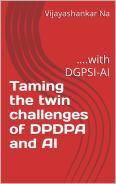It is good to see that RBI at last appear to be walking its talk on hardening the security in Banks. After the last circular on “Cyber Security Framework” (June 2, 2016), which while reiterating the earlier circulars issued after the G.Gopalakrishna working group (GGWG) which was largely ignored in implementation, the July 31 deadline for Gap Analysis and September 30 deadline for putting a new policy in place must be haunting the Bankers. Those in the Banking system who have understood the import of the circular and want to be compliant must be spending sleepless nights.
In the meantime, it is reported that Deputy Governor R Gandhi at an IDRBT participating in an event in Hyderabad on July 19, has confirmed that RBI has constituted a working group on financial technology, “to fully understand the new paradigm of Fintech and to chart out the best way of using it”. (A Copy of the speech is available here)
It was also noticeable that for the first time, RBI has also drawn attention of the Government on the Fraud risks associated with the Jan Dhan Yojana scheme which has been highlighted in these columns on various occasions. (Refer artice in IE)
It would however have been better if RBI had also endorsed our suggestions regarding provision of Cyber Crime Insurance to the Jan Dhan users along with proper education and technical help for security.
Hopefully once the risk is flagged, some measures would follow. Probably the working group on FinTech will address these issues in their deliberations.
The Constitution of the Working Group iss indicated in this notification
The Working Group will consist of 13 members including the Chairman Shri Sudarshan Sen, Executive Director. Other members as shown below.
| (i) | Shri Sudarshan Sen, Executive Director, RBI | Chairman |
| (ii) | Dr. Sarat Kumar Malik, CGM, SEBI | Member |
| (iii) | Shri R.K. Sharma, Joint Director, IRDAI | Member |
| (iv) | Shri Rakesh Sharma, GM, PFRDA | Member |
| (v) | Shri A. P. Hota, MD & CEO, NPCI | Member |
| (vi) | Dr. A. S. Ramasastri, Director, IDRBT | Member |
| (vii) | Shri R Ravikumar, CGM, DBS, RBI | Member |
| (viii) | Smt. Nanda S. Dave, CGM, DPSS, RBI | Member |
| (ix) | Shri Mrutyunjay Mahapatra, DMD, & CIO, SBI | Member |
| (x) | Shri Nitin Chugh, Head, Dig. Bkg. HDFC Bank | Member |
| (xi) | Shri Amish Mehta, CFO, CRISIL | Member |
| (xii) | Shri A. Joseph, JLA, LD, RBI | Member |
| (xiii) | Shri Prasant K. Seth, GM, DBR, RBI | Member-Secretary |
Notably, there is no representation of ICICI Bank, a regular participant of all RBI working groups on Banking matters but HDFC Bank and SBI represent the Banking industry. Surprisingly , there is no representation from the FINTECH industry and as usual from the Consumer side.
In the past RBI working Groups have been dominated by some industry players who have successfully tried to manipulate the RBI policies through such working group. During the times of the GGWG group Naavi fought a tough battle to ensure that some motivated changes which were not legally sound were not part of the recommendations.
The RBI Circular however states that the Working Group may invite views from representatives from any area relevant to its terms of reference and may also, at its discretion, co-opt entities in the payment, telecom, software and start up ecosystem. Hope this would be implemented in practice and does not remain on paper only.
The terms of reference of the Working Group is:
- To undertake a scoping exercise to gain a general understanding of the major Fin Tech innovations / developments, counterparties / entities, technology platforms involved and how markets, and the financial sector in particular, are adopting new delivery channels, products and technologies.
- To assess opportunities and risks arising for the financial system from digitisation and use of financial technology, and how these can be utilised for optimising financial product innovation and delivery to the benefit of users / customers and other stakeholders.
- To assess the implications and challenges for the various financial sector functions such as intermediation, clearing, payments being taken up by non-financial entities.
- To examine cross country practices in the matter, to study models of successful regulatory responses to disruption across the globe.
- To chalk out appropriate regulatory response with a view to re-aligning / re-orienting regulatory guidelines and statutory provisions for enhancing Fin Tech / digital banking associated opportunities while simultaneously managing the evolving challenges and risk dimensions.
- Any other matter relevant to the above issues.
Perhaps we need to watch out how the recommendations of the FinTech Working Group developsand whether it will properly represent the views of the Fin Tech industry and the interest of the public who are consumers of the services rendered by these companies as well as Banks.
Naavi






